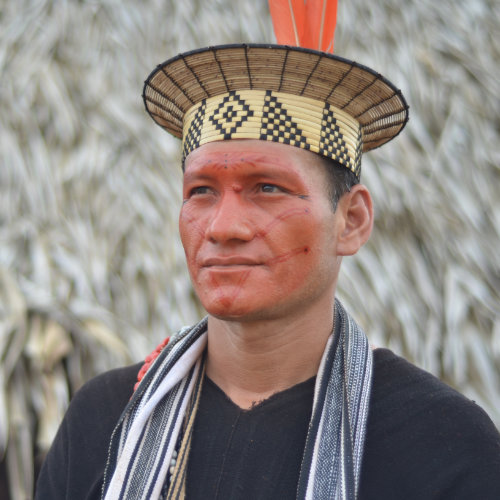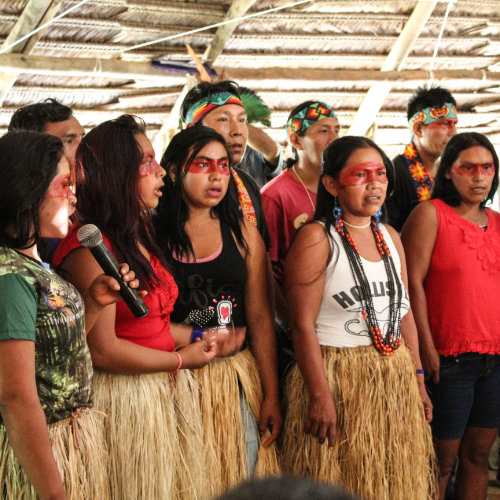
History
Discussions around the use, transportation, diffusion and protection of traditional knowledge and wisdom related to ayahuasca have been intensifying since the year 2015, through articulation and debates between the Indigenous peoples of Acre with the Brazilian governmental agencies of internal control, patrimony and inspection. Ayahuasca has been used, for many years, as a traditional base for the spiritual and medicinal work of many aboriginal peoples, making this drink extremely important for ritual practice and for the perpetuation of the traditional knowledge and wisdom of these peoples.
It is fitting that we make an observation on the use of the term Ayahuasca. This term does not substitute the various denominations given by each people, such as kamarãpi, uni, huni, dispãnī hew, tsĩbu, caapi, gaapi, among others. Nonetheless, since the 1st Indigenous Conference on Ayahuasca, it was decided in plenary session that Ayahuasca would be used because it is a term that embraces the use of this medicine in diverse contexts.
The proposal for the first Indigenous conference to discuss issues related to ayahuasca was a reaction to the manner in which Indigenous participants were involved in the discussions during the World Ayahuasca Conference, principally at the AYA2016 — 2nd World Ayahuasca Conference, put on by ICEERS (International Center for Ethnobotanical Education, Research & Service), in the city of Rio Branco, Acre, in October 2016.
Despite the Indigenous peoples’ ineffective participation, the discussion held during this event reinforced the necessity for deeper reflections on ways of protecting traditional wisdom related to this medicine, taking into consideration mainly the Indigenous protagonism and viewpoint, as stated in the “Open Letter from the Indigenous Peoples of Acre about the World Ayahuasca Conference.”
The importance of Indigenous protagonism in this discussion was publicly defended by the Ashaninka leader, Benki Piyãko. This position was shared and taken up by Biraci Nixiwaka Yawanawá and Joel Dëvakï Puyanawa who, together, reflected on the need for a discussion space where the Indigenous peoples would be the protagonists. This proposal was presented by Benki in December 2016, during the Assembly of the Indigenous Organizations OPITAR (the Indigenous Peoples of Tarauacá Organization), OPIRE (the Indigenous Peoples of Rio Envira Organization) and OPIRJ (the Indigenous Peoples of Rio Juruá Organization).
After deliberation, Indigenous community representatives presented the demand for the establishment of a space for dialogue on the issue that the Santo Daime churches had begun — the “patrimonialization” of ayahuasca — so that, by better understanding this concept and what it would represent for the traditional Indigenous spiritual culture, it would be possible to take a position on the theme. It was then defined that an annual event would be the official discussion space for the issues related to ayahuasca, a local “Indigenous governance,” that was started in December 2017. The chosen format was that of “conference,” and thus it was named the “Indigenous Conference on Ayahuasca.”
The first two conferences, in 2017 and 2018, reached a spectacular level of participation of Indigenous peoples and others interested in the topic. The relevance of this debate, which was conducted by the Indigenous spiritual leaders, aroused interest among the diverse layers of non-Indigenous society. Each event brought together people from a number of countries, as well as various Brazilian public institutions and civil society organizations, both national and international. Even the presence of Brazilian federal justice magistrates was registered, giving the event an important judicial nature for the claims and the themes that were discussed.







As determined in the second edition of the event, the Yorenka Tasorentsi Institute (IYT) received the third Conference in 2019, anticipating the participation of over one hundred and twelve representatives of the Indigenous peoples of Acre, as well as the state of Amazonas and countries such as Peru and Colombia. Moreover, the event counted on the participation of various national and international institutions, local political authorities and researchers. With the executive team, invited guests and a scattering of visitors added up, over three hundred people were present for the seven days of the event at the Yorenka Tasorentsi Institute.
The 4th Indigenous Conference on Ayahuasca will be held again at the IYT and will represent the beginning of a goal that was laid out in the first edition: to raise funds from the event’s organization itself without counting on public financing, thus favoring more autonomy in its implementation. This change in stance is only made possible due to donations from important IYT partners, who see in this initiative a significant dialogue and representation space for aboriginal peoples from diverse locations in Brazil and other parts of the world, such as Peru, Ecuador, Colombia, Mexico, Canada and Australia, as well as institutional partners and researchers.
Text production, video and audiovisual recordings are made with the intention of creating reference materials for the study and publicity of this topic as one of the fundamental points on the Indigenous rights agenda.


FREQUENTLY ASKED QUESTIONS
The Indigenous Conference on Ayahuasca is an important discussion and deliberation space for Indigenous peoples on the uses, customs and sharing of knowledge about traditional medicine. Today the Conference is on its fifth edition.
The Conference is a closed event. There is no charge. Only the presence of previously chosen guests is permitted. The necessary limit on the number of participants guarantees spaces of open and safe discussion for the Indigenous peoples
The fourth edition of the Indigenous Conference on Ayahuasca will occur from January 25 to 30, 2025.
The Indigenous Conference on Ayahuasca will go on for 05 days.
Aldeia Sagrada, Yawanawa People, Rio Gregório Indigenous Land, municipality of Tarauacá/AC
During the event, areas will be available for the consumption of products such as fruit juice and coconut water, and for the purchase of Indigenous handicrafts.
Internet access will be available only for the event organization, allowing the participants to effectively honor the debates during the Conference by avoiding unnecessary distractions during the sessions.
The event will rely on basic medical and nursing services, called to action when necessary. However, if the participant uses any medication, the prescription, purchase and treatment will be of their own exclusive responsibility.
The program will be disclosed only to the invited participants at an opportune moment.
Only Indigenous peoples and the people and teams authorized by the Conference organization may make photographic, video or audio recordings. The limitation on these activities aims to guarantee a safe environment of open discussion for the participants.

























